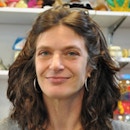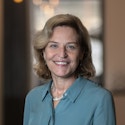By clicking to watch this video, you agree to our privacy policy.
On 3 December 2014, Karen E. Adolph discussed how infants learn to generate and control their movements by adapting to environmental and social factors.
Her talk, which covered ways in which a variety of external factors affect how infants learn to move, was part of the Simons Foundation Autism Research lecture series. Adolph explained how infants adaptively learn to move rather than acquiring fixed solutions.
About the Lecture
Basic motor skills such as looking, reaching and walking do not simply appear as the result of maturation. Rather, infants must learn to move. Learning entails discovering new forms of movements to suit the task at hand and using perceptual information to select and modify movements adaptively.
In this lecture, Karen E. Adolph discussed how infants learn to generate and control their movements by adapting to environmental and social factors. Learning to move involves more than merely lifting the limbs against gravity. Adaptive action requires that movements be constructed, selected and modified in accordance with the constraints and opportunities provided by the physical and social environment. The learning process is geared toward flexibility rather than rote performance: Infants are learning to move rather than acquiring fixed solutions.
Commentator Cole Galloway provided post-lecture commentary that highlighted how mobility and socialization affect the lives of infants with special needs and their families. Galloway is director of the Pediatric Mobility Lab and Design Studio, and professor of physical therapy at the University of Delaware. Galloway began focusing on young children following a postdoctoral fellowship with Esther Thelen. His research focuses on how multiple biological, psychological and environmental factors contribute to the emergence of exploratory behaviors. Current projects focus on advancing the technology and training to assist children in maximizing their daily exploration.




